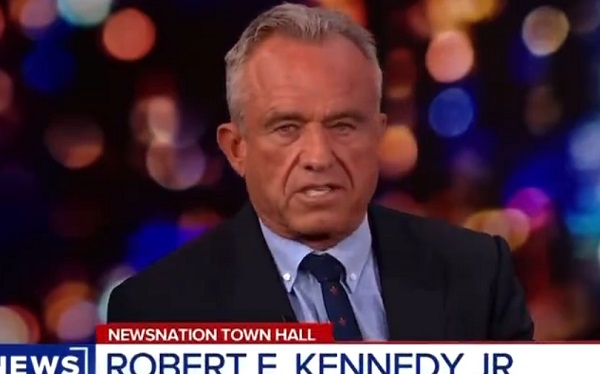International
RFK Jr: Trump has ‘asked me to clean up the corruption’ in federal health agencies

From LifeSiteNews
Robert F. Kennedy Jr. said he has been tasked by Donald Trump with ending the conflicts of interest that now compromise the integrity of U.S. health agencies, with devastating ripple effects on the well-being of Americans.
Former Democrat-turned-independent presidential candidate Robert F. Kennedy Jr. said Wednesday that former President Donald Trump has asked him to reorganize and “clean up” federal health agencies like the CDC and FDA if Trump is re-elected in November.
Kennedy, who joined Trump’s presidential transition team in late August after dropping out of the race himself and then endorsing the former president, shared in an appearance on NewsNation that Trump wants him to “reorganize the federal health agencies” affecting human health, including the Centers for Disease Control and Prevention (CDC), the National Institutes of Health (NIH), the Food and Drug Administration (FDA), as well as some of the agencies within the USDA.”
“He’s asked me to clean up the corruption, number one,” Kennedy said. “Number two, end the conflicts of interest.”
In recent years, Kennedy has spoken much publicly about the pattern of corruption and conflicts of interest that he witnessed firsthand during his many years as an environmental attorney. During Kennedy’s presidential run, he discussed how the “corporate capture” of regulatory agencies is the “biggest threat to American democracy.”
As Kennedy explained during his Wednesday NewsNation appearance, “When you litigate these agencies, you get a Ph.D. in corporate capture and how to unravel it.”
According to Kennedy, the problem is pronounced in health agencies, where for example, the FDA “gets 50 percent of its budget from Big Pharma” and the NIH “collects royalties when (a) pharma company sells (its) product,” as he explained in an interview last year.
Kennedy went on to share Wednesday that he has been tasked by Trump with “return(ing)” those U.S. health agencies “to their rich tradition of gold-standard, empirically based, evidence-based medicine.”
He shared that Trump has also tasked him with ending “the chronic disease epidemic in this country,” adding, “And he’s asked me specifically to measurably reduce chronic disease in our children within two years.”
On Wednesday, he cited statistics showing unprecedented, drastically poor patterns of health in Americans, especially in children.
“When I was a kid and my uncle was President, six percent of Americans had chronic disease. Today, it’s 60 percent,” RFK Jr. said in reference to John F. Kennedy, who was president from 1961 to 1963.
According to Kennedy, a staggering “77% of American boys cannot qualify for the military because of a chronic disease, and that while when he was a child, “the average pediatrician saw one case of diabetes in his lifetime,” now one out of every three kids is diabetic or pre-diabetic.
He further shared that in his generation, only “one in 10,000” has full-blown autism, whereas now the rate is one in 34 children.
“This is an existential threat to the country,” said Kennedy, adding that Trump wants his “legacy to the American people” to be “the end of the chronic disease epidemic.”
Business
Canada’s critical minerals are key to negotiating with Trump

From Resource Works
The United States wants to break its reliance on China for minerals, giving Canada a distinct advantage.
Trade issues were top of mind when United States President Donald Trump landed in Kananaskis, Alberta, for the G7 Summit. As he was met by Prime Minister Mark Carney, Canada’s vast supply of critical minerals loomed large over a potential trade deal between North America’s two largest countries.
Although Trump’s appearance at the G7 Summit was cut short by the outbreak of open hostilities between Iran and Israel, the occasion still marked a turning point in commercial and economic relations between Canada and the U.S. Whether they worsen or improve remains to be seen, but given Trump’s strategy of breaking American dependence on China for critical minerals, Canada is in a favourable position.
Despite the president’s early exit, he and Prime Minister Carney signed an accord that pledged to strike a Canada-US trade deal within 30 days.
Canada’s minerals are a natural advantage during trade talks due to the rise in worldwide demand for them. Without the minerals that Canada can produce and export, it is impossible to power modern industries like defence, renewable energy, and electric vehicles (EV).
Nickel, gallium, germanium, cobalt, graphite, and tungsten can all be found in Canada, and the U.S. will need them to maintain its leadership in the fields of technology and economics.
The fallout from Trump’s tough talk on tariff policy and his musings about annexing Canada have only increased the importance of mineral security. The president’s plan extends beyond the economy and is vital for his strategy of protecting American geopolitical interests.
Currently, the U.S. remains dependent on China for rare earth minerals, and this is a major handicap due to their rivalry with Beijing. Canada has been named as a key partner and ally in addressing that strategic gap.
Canada currently holds 34 critical minerals, offering a crucial potential advantage to the U.S. and a strategic alternative to the near-monopoly currently held by the Chinese. The Ring of Fire, a vast region of northern Ontario, is a treasure trove of critical minerals and has long been discussed as a future powerhouse of Canadian mining.
Ontario’s provincial government is spearheading the region’s development and is moving fast with legislation intended to speed up and streamline that process. In Ottawa, there is agreement between the Liberal government and Conservative opposition that the Ring of Fire needs to be developed to bolster the Canadian economy and national trade strategies.
Whether Canada comes away from the negotiations with the US in a stronger or weaker place will depend on the federal government’s willingness to make hard choices. One of those will be ramping up development, which can just as easily excite local communities as it can upset them.
One of the great drags on the Canadian economy over the past decade has been the inability to finish projects in a timely manner, especially in the natural resource sector. There was no good reason for the Trans Mountain pipeline expansion to take over a decade to complete, and for new mines to still take nearly twice that amount of time to be completed.
Canada is already an energy powerhouse and can very easily turn itself into a superpower in that sector. With that should come the ambition to unlock our mineral potential to complement that. Whether it be energy, water, uranium, or minerals, Canada has everything it needs to become the democratic world’s supplier of choice in the modern economy.
Given that world trade is in flux and its future is uncertain, it is better for Canada to enter that future from a place of strength, not weakness. There is no other choice.
International
Trump puts new price tag on Canada joining “Golden Dome”

Quick Hit:
President Trump has upped the cost for Canada to join the U.S. “Golden Dome” missile defense program to $71 billion—$10 billion more than his previous ask.
Key Details:
- Trump confirmed the new $71 billion figure while speaking to reporters aboard Air Force One.
- Canada has pushed back, with PM Mark Carney and diplomats calling Trump’s offer a “protection racket.”
- Trump said Canada could access the system for free if it became the 51st U.S. state.
Diving Deeper:
President Trump has put a new and steeper price on Canada’s potential entry into America’s “Golden Dome” missile defense program. Speaking from Air Force One on Monday, Trump told reporters, “They want to be in… Seventy-one billion they’re going to pay.”
That’s a $10 billion increase from the $61 billion figure Trump had previously floated, marking a sharp escalation in his negotiations with Ottawa. The Golden Dome, described by the administration as a “state-of-the-art” defense shield, aims to protect North America from a new era of missile threats—particularly those posed by China, Russia, and North Korea.
Trump has framed the Golden Dome as the long-awaited realization of Ronald Reagan’s “Star Wars” vision, using space-based sensors and interceptors to strike down incoming ballistic, cruise, or hypersonic missiles. Development timelines suggest full deployment is still 5–7 years off, but an initial $25 billion is already allocated in next year’s defense budget. The entire project may run upwards of $175 billion, with some estimates as high as $542 billion over 20 years.
Canada, which has long partnered with the U.S. under NORAD to detect airborne threats, has expressed interest in joining the project. But Trump is demanding a separate, costly buy-in. He reiterated that Ottawa would “have to pay a lot of money” to participate unless it pursued a full political union with the U.S. “It would be free if Canada became the 51st state,” he added.
Canadian leaders have pushed back hard. Prime Minister Mark Carney, re-elected in April after campaigning against U.S. interference, said Canada wants to protect its citizens but not under terms dictated from Washington. Ambassador to the U.N. Bob Rae went further, calling Trump’s offer a “protection racket.”
-

 Business1 day ago
Business1 day agoThe CBC is a government-funded giant no one watches
-

 conflict2 days ago
conflict2 days agoTrump leaves G7 early after urging evacuation of Tehran
-

 conflict1 day ago
conflict1 day agoMiddle East clash sends oil prices soaring
-

 Crime2 days ago
Crime2 days agoUK finally admits clear evidence linking Pakistanis and child grooming gangs
-

 Also Interesting2 days ago
Also Interesting2 days agoHow to Use Bonuses at Magius Casino and Similar Websites
-

 conflict1 day ago
conflict1 day agoTrump Threatens Strike on Khamenei as Israel Pounds Iranian Military Command
-

 Alberta1 day ago
Alberta1 day agoAlberta is investing up to $50 million into new technologies to help reduce oil sands mine water
-

 Business1 day ago
Business1 day agoTrump makes impact on G7 before he makes his exit






